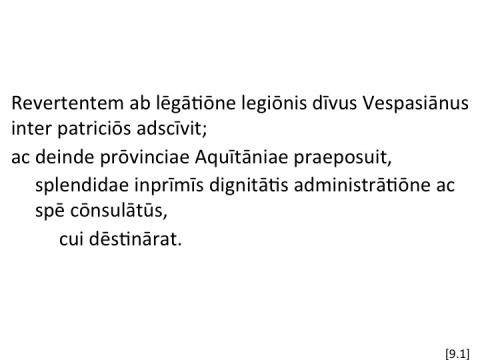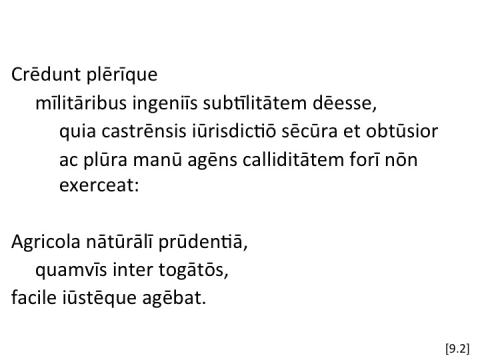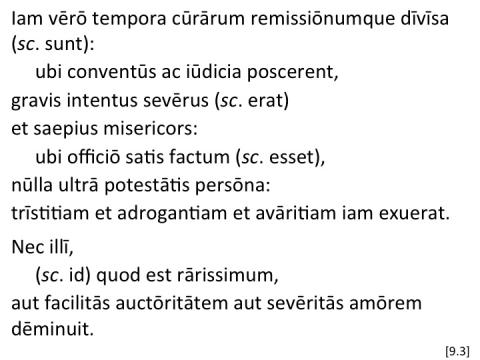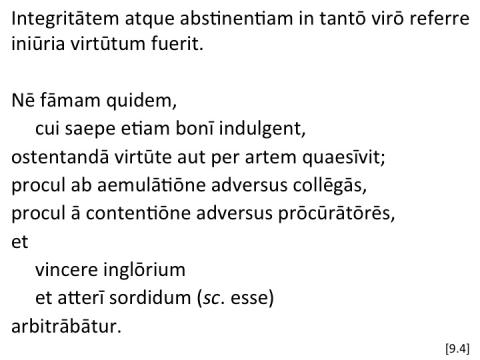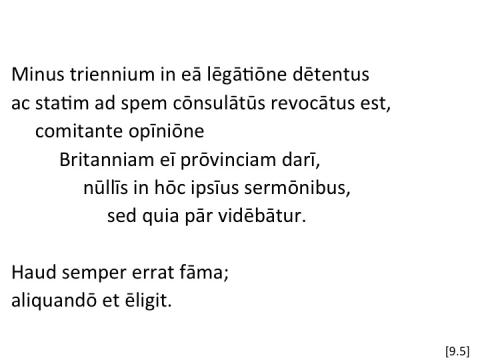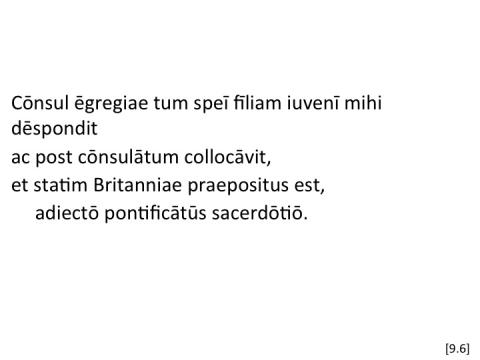[9.1] Revertentem ab lēgātiōne legiōnis dīvus Vespasiānus inter patriciōs adscīvit; ac deinde prōvinciae Aquītāniae praeposuit, splendidae inprīmīs dignitātis administrātiōne ac spē cōnsulātūs, cui dēstinārat. [9.2] Crēdunt plērīque mīlitāribus ingeniīs subtīlitātem dēesse, quia castrēnsis iūrisdictiō sēcūra et obtūsior ac plūra manū agēns calliditātem forī nōn exerceat: Agricola nātūrālī prūdentiā, quamvīs inter togātōs, facile iūstēque agēbat. [9.3] Iam vērō tempora cūrārum remissiōnumque dīvīsa: ubi conventūs ac iūdicia poscerent, gravis intentus sevērus et saepius misericors: ubi officiō satis factum, nūlla ultrā potestātis persōna: trīstitiam et adrogantiam et avāritiam <iam> exuerat. Nec illī, quod est rārissimum, aut facilitās auctōritātem aut sevēritās amōrem dēminuit. [9.4] Integritātem atque abstinentiam in tantō virō referre iniūria virtūtum fuerit. Nē fāmam quidem, cui saepe etiam bonī indulgent, ostentandā virtūte aut per artem quaesīvit; procul ab aemulātiōne adversus collēgās, procul ā contentiōne adversus prōcūrātōrēs, et vincere inglōrium et atterī sordidum arbitrābātur. [9.5] Minus triennium in eā lēgātiōne dētentus ac statim ad spem cōnsulātūs revocātus est, comitante opīniōne Britanniam eī prōvinciam darī, nūllīs in hōc ipsīus sermōnibus, sed quia pār vidēbātur. Haud semper errat fāma; aliquandō et ēligit. [9.6] Cōnsul ēgregiae tum speī fīliam iuvenī mihi dēspondit ac post cōnsulātum collocāvit, et statim Britanniae praepositus est, adiectō pontificātūs sacerdōtiō.
notes
Overview: Agricola's advancement continues; his excellent administration of Aquitania; he reaches the consulship; marriage of Tacitus and Agricola's daughter; Agricola becomes governor of Britain. (Stuart) He is made governor of Aquitania, and shows high administrative powers. His consulship and appointment to the governorship of Britain. (Pearce)
9.1
revertentem: Agricola probably returned to Rome in 73 CE (for the date see Introduction). (Damon); “when he came back to Rome.” The past participle might seem more logical. (Pearce); “immediately on his return,” i.e. in 74 CE, probably in company with the retiring legate, Petilius Cerialis. For the force of the present participle we may compare ch. 18.5, ingredienti, 28.1, uno rem negante. (Gudeman)
dīvus Vespasiānus: the title divus, conferred by the Senate upon the best of the Emperors after their death, was the outcome of their unlimited power and generally beneficent rule acting upon the imagination of men accustomed to similar titles among Eastern potentates. (Pearce)
inter patriciōs: from the time of Julius Caesar and Augustus the principes had been given or had assumed in virtue of their censorial power the right to fill the depleted ranks of the old patrician families by conferring the patriciate on distinguished men. (Stuart) patriciōs: this honour had a purely social value for the recipient. (Pearce) inter patriciōs adscīvit: this was done originally by Caesar and Augustus for the purpose of replenishing the decimated ranks of the patriciate, subsequently by way of compliment to illustrious men, the selection of non-Italians probably not antedating the reign of Claudius. (Gudeman)
prōvinciae Aquītāniae: Augustus divided Gaul, exclusive of the Province, into three administrative districts: Gallia Lugdunensis, Belgica, and Aquitania. Each was governed by a legate of praetorian rank. (Stuart); this province extended since Augustus' time from the Pyrenees to the Loire. (Pearce); the government of this most important praetorian province seems to have been a direct stepping-stone to the consulship. (Gudeman)
splendidae inprīmīs dignitātis: a genitive of quality loosely joined to Aquitaniae. (Stuart) [A&G §345]; sc. provincia. On this elliptical genitive of quality, see note ch. 4.3. (Gudeman)
administrātiōne ac spē: explains splendidae. Aquitania was the most important of the praetorian provinces, and was naturally regarded as a step to the consulship. (Pearce); “by virtue of its administrative functions and the hope it held out for.” (Gudeman)
dēstinārat: subject Vespasianus; object Agricolam. (Pearce); sc. eum. On the ellipsis of the demonstrative pronoun, see Introd. p. xxxi, #4. (Gudeman)
9.2
crēdunt plērīque: “it is a very common belief.” On the position of the predicate, see Introd. p. xxvi, #3. (Gudeman)
mīlitāribus ingeniīs: “men of a military bent.” (Stuart)
subtīlitātem: “acumen,” i.e. a legal mind trained to weigh testimony, fluency of exposition being also implied. (Gudeman)
sēcūra et obtūsior: “informal and somewhat rough and ready.” The military court would thrust aside the fine distinctions of civil procedure and would concern itself chiefly with the spirit of the law. (Stuart) sēcūra: “irresponsible.” (Pearce); “easy-going,” because not subject to appeal, opposed to gravis, thoughtful, concerned, owing to a feeling of responsibility. (Gudeman) obtūsior: “somewhat rough in its methods.” For the combination of positive and comparative see note on 1.2 pronum magisque in aperto. (Pearce); "rather blunt, curt.” (Gudeman)
plūra manū agēns: “generally doing business in an offhand fashion.” Martial law would not have to concern itself with the possibility of an appeal from its decisions. (Stuart); explanatory of obtusior. (Pearce) manū agēns: “high-handed, summary.” (Gudeman)
exerceat: subjunctive (in oratio obliqua) to reflect the sentiments of plerique. (Stuart) [A&G 580 and 540.2b]; “bring into play,” “call for.” (Pearce) nōn exerceat: “has no practice in, does not make use of,” as forensic subtlety is not acquired in the school-room, but by actual experience in the law-courts. (Gudeman)
prūdentiā: variously explained as ablative of cause or of ablative of quality. (Stuart) [A&G 404 & 415]; best taken as ablative of cause, “by reason of his good sense.” (Gudeman)
togātōs: a standing term for civilians, since the toga was the distinctive garb of peace as opposed to the sagum or soldier's cloak. (Stuart)
facile: “without awkwardness.” (Pearce) facile ... agēbat: sc. res iudiciales. facile, "with despatch," as if he had had legal training. (Gudeman)
9.3
iam vērō: “besides, furthermore;” a formula of transition, usually emphatic, occurring occasionally in Tacitus. (Gudeman)
divisa: sc. sunt. (Damon)
conventūs: the provinces were divided into judicial districts in which assizes were regularly held by the governor. Conventus signifies either the district or the session, here evidently the latter. (Stuart) iūdicia: “trials,” specifying exactly the business of the conventus. (Stuart) conventūs ac iūdicia: “circuit courts.” Iudicia is added as the more specific term for the sake of nearer definition, according to a characteristic usage in Tacitus. See Introd. p. xxx, #17. (Gudeman)
ubi ... poscerent: this use of the subjunctive to express repeated action is post-classical ... . Classical Latin would employ ubi poposcerant of past, and ubi poposcerunt of present time. (Pearce) [A&G 542]; the subjunctive of repeated action with ubi occurs only here in the minor works, though common in the Histories and Annals and in post-Augustan writers generally. (Gudeman)
gravis … sevērus: sc. erat. (Damon); gravitas, “dignity, sobriety,” and severitas, “strictness,” are often coupled as the typical qualities affected by the Roman magistrate and statesman of the old school. (Stuart)
et: adversative, “yet.” (Stuart) et saepius: et as often implies a contrast = et tamen. Or saepius may be contrasted with a saepe understood with severus. (Pearce) et saepius misericors: sc. erat. On et, “and at the same time, besides,” after an asyndeton, see Introd. p. xxviii,#11 ... . On the cumulative force of the asyndeton, see Introd. p. xxvii #11c. (Gudeman)
officium: means (1) voluntary service: (a) a kindness, favour, (b) ceremonial observance, attendance (post-Augustan), 40.3 vitato amicorum officio; 18.5 per … officiorum ambitum; (2) obligation, duty: (a) duty in general. (b) i. an official duty (as here), ii. office, appointment, 14.2 fama aucti officii, 25.1 sextum officii annum. (Pearce)
ubi … factum: sc. esset. The ellipsis of the subjunctive forms of esse is rare and generally permitted only when a preceding subjunctive (so poscerent here) prevents any ambiguity. See note on Introd. p. xxxii, 6b. (Gudeman)
nūlla ultrā potestātis persōna: sc. erat, in symmetry with its parallel clause, misericors (sc. erat), above. After the adjournment of the court, Agricola, unlike other legates, no longer kept up his judicial demeanor. (Gudeman)
trīstitiam: the magisterial severitas when it has passed proper bounds. The defects here mentioned are the stock failings attributed to Roman officialdom at all times. (Stuart) exuerat: Agricola “had divested himself of,” hence, was free from those qualities which as one of the class of provincial governors he might reasonably have been expected to possess. This sentence does not refer simply to his behavior as a presiding judge of the conventus, but describes his conduct in the whole business of administration. (Stuart) trīstitiam … exuerat: if retained, these words must be a parenthetical explanation of nulla … persona. We must then take tristitiam, adrogantiam, avaritiam as qualities which, if ungenial in themselves, might yet have been ascribed without insult to a good governor in his official capacity, viz. "severity," dignity," and "strictness in exacting the treasury dues." But this is to put too great a strain upon words which naturally imply a distinctly unpleasant character, and we may believe with Furneaux that the passage is an unfortunate gloss upon the preceding words. The alternative is to take exuerat not = "had laid aside," but "kept clear of" the three bad qualities mentioned, which were the natural pitfalls for a governor's reputation. But the passage is then very awkward. (Pearce) trīstitiam ... exuerat: “he had cast off moroseness and hauteur and covetousness.” The figure, common in Tacitus, is taken from a dress, which can be put off or on at pleasure. Strictly speaking, he, as Agricola, could not, of course, cast off what he never had; but Tacitus means to say that as legatus he had divested himself, the moment he entered upon this office, of all those qualities which the Romans from time immemorial had come to regard as inseparable from it. The ambiguity was due to a striving for conciseness. (Gudeman) trīstitiam ... avāritiam <iam> exuerat: many editors excise this passage as a scribe's comment on nulla ... potestatis persona. But the language, particularly exuerat, is Tacitean. The emendation, which assumes that the temporal adverb iam fell out after the identical string of letters in the preceding word, puts Agricola's "shedding" of these vices further into the past, perhaps to be credited to his philosophical education, described in ch. 4. (Damon)
facilitās: “affability,” when not acting in an official capacity, and with the implication that he was easily accessible. So again ch. 40.4, with facilis. (Gudeman)
9.4
iniūria: because in such a good man as Agricola, his integrity would be beyond question. (Pearce)
fuerit: aorist potential. This use with a non-personal subject is unclassical. (Pearce) [A&G 447]
fāmam ... indulgent: a commonplace. (Gudeman)
ostentandā virtūte aut per artem: per artem implies machinations by which subjects should be induced to give a favorable account of his government. (Stuart) per artem: “by means of intrigue.” (Pearce); on this peculiarly Tacitean change of construction for the sake of variety, see Introd. p. xxxiv, #2. per artem, "by intrigues." See note on ch. 27.2. (Gudeman)
collēgās: more particularly the governors of the neighboring provinces, such as Gallia Narbonensis and Gallia Lugdunensis. (Gudeman)
contentiōne adversus prōcūrātōrēs: it is conceivable that friction might arise between the military head of the province and the imperial representative in charge of the bureau of finance. How far the procurator was subject to the legate's control is a matter of doubt. Beside the chief procurator of the fiscus, there were other officials charged with various functions in the province who bore the title. (Stuart) prōcūrātōrēs: the procurator was the fiscal agent of Caesar, and in an imperial province answered to the quaestor of a senatorial province. The plural perhaps suggests a succession of these officers during Agricola's three years of command. (Pearce); probably a rhetorical plural for sake of symmetry with collegas. See note ch. 5.2, coloniae. Observe the careful libration of these two clauses. (Gudeman)
atterī sordidum: sc. esse. The infinitives vincere and atteri function as the accusative subject of the indirect statement, esse as the infinitive verb. (Damon) [A&G 452]; “disgraceful to suffer compromise of dignity.” Even victory in a petty squabble with an under-officer would be discreditable, to say nothing of defeat. (Stuart) atterī: “to come worse off.” (Pearce)
9.5
minus triennium = minus quam triennium; quam is regularly omitted between minus (and plus) and numerical expressions. [A&G 407c] Agricola returned to Rome in 76 CE (for the date see Introduction). (Damon); the usual term of office in an imperial province was from three to five years. (Pearce); in the Caesarian provinces the emperors corrected what had been a serious flaw in the Republican system of provincial government, annual rotation in office. (Stuart); the fact that Agricola was legatus pro praetore for even less than the usual period probably accounts for the renewed expectation that his election to the consulship would follow immediately, his hope being originally based on the fact that he was governor of Aquitania. See note above, ch. 9.1. (Gudeman)
ad spem, etc.: i.e. he was recalled to Rome, cherishing the hope of an immediate appointment to the consulship. (Gudeman)
dētentus: governors could not leave their provinces or resign from office without the approval of the emperor. (Stuart)
statim: join with spem consulatus in translation. Adjectival use of adverbs is frequent in Tacitus. See note on ch. 25.1, universarum ultra gentium. (Stuart)
darī: the gnomic present tense here indicates a general truth. (Fox) [A&G 465]; the present instead of the future tense here indicates that the appointment in the popular opinion was already settled. (Pearce); the present infinitive implies the correctness of the belief, although it was as yet based only on opinio, not actual information, a circumstance still further emphasized by the poetic quotation. (Gudeman) (See on eligit below for the quotation.) (Damon)
nūllīs … sermōnibus: the ablative absolute without a participle is a characteristic usage of Tacitus. (Stuart) [A&G 419]
in hōc: hoc is accusative, "to this purport." (Pearce); owing to the verbal force in sermonibus, an elliptical abl. abs. (Gudeman) [A&G 419]
pār: he seemed “equal to the task.” (Stuart); because Agricola was the best fitted for the office. (Gudeman)
et ēligit: this present tense form is the reading of the principal manuscript; elegit (see below), which is generally taken to be a perfect tense form, is the reading of its copies. The verb concludes a sentence that can also be analysed as a poetic verse and is either a quotation from an unknown source (so Gudeman) or a composition by Tacitus, in each case functioning as a stylistic device to adorn the conclusion of this portion of the biography. Et, "even" or "actually," here connects two statements, the second of which corrects the first. (Damon) haud … ēlēgit: “rumor is not always unreliable; occasionally it has even made the right selection” (i.e. in advance of authentic information). The verse is a choliambus or scazon, elegit being the so-called gnomic perfect, which is chiefly poetic. We may, however, equally well regard elegit as an archaic form of the present (see intellego for intelligo), in which case the line would be a senarius. (Gudeman) [A&G 475]
9.6
cōnsul: Agricola held the office of consul suffectus in the year 76 (for the date see Introduction). (Damon); beside the consules ordinarii who gave their names to the year it was the custom under the Empire to designate other men to bear the title of consul through terms of from two to four months. These were called suffecti. (Stuart)
ēgregiae tum speī: “at that time showing wonderful promise for the future.” She was then thirteen years old; there are records of Roman girls who were married at an age earlier than this. (Stuart); this seems to have been an expression for the marriageable age of women. ... The usual interpretation of this passage must make tum = etiam tum, a meaning which is not found anywhere. (Gudeman)
iuvenī: Tacitus was about twenty-five years old. (Pearce); Tacitus was about 23 or 24 at the time of his marriage, being born about 54/55 CE. (Gudeman); scholars disagree about the exact birth year of Tacitus. Some think it was around 54 CE and others as late as 58 CE. This prevents us from saying definitively how old he was when he married Agricola’s daughter. (Fox)
post cōnsulātum: in 77 CE (for the date see Introduction). (Damon); Agricola's consulship seems, like his other curule offices, not to have been marked by any features worth recording, and, therefore, Tacitus contents himself with this bare reference. See note ch. 6.3. His colleague was the future emperor Domitian, then twenty-six years old, and consul suffectus for the fifth time. (Gudeman)
pontificātūs: genitive of definition. The college of pontiffs numbered at this time fifteen members; its president, the pontifex maximus, was always the Emperor. (Pearce) [A&G 342]; membership in the religious colleges was an honor much coveted. ... The emperor nominated prospective members; power of election, which amounted simply to confirmation, was vested in the senate. (Stuart); this high pontifical function ... was rarely held by men beneath consular rank. (Gudeman)
vocabulary
lēgātiō lēgātiōnis f.: office of legatus, command
Vespasiānus –ī m.: Vespasian, emperor 69-79
patricius –a –um: patrician; (as noun) a patrician
adscīscō –ere –scīvī –scītus: to admit, enroll among
Aquītānia –ae f.: Aquitania
praepōnō praepōnere praeposuī praepositum: to put at the head of (+acc. and dat.)
splendidus –a –um: brilliant, illustrious
imprīmīs: especially
administrātiō administrātiōnis f.: official charge, office
cōnsulātus cōnsulātūs m.: consulship
dēstinō dēstināre dēstināvī dēstinātus: to intend
mīlitāris –ris –re: military, of soldiers
subtīlitās subtīlitātis f.: subtlety, acumen
castrēnsis –e: belonging to the camp
iūrisdictiō iūrisdictiōnis f.: court business, administration of justice
obtundō obtundere obtudī obtū(n)sum: to blunt, weaken
calliditās –ātis f.: shrewdness
Agricola –ae m.: Agricola
nātūrālis –e: natural
prudentia prudentiae f.: prudence, good sense
togātus –a –um: wearing the toga; (as a noun) a civilian
remissiō remissiōnis f.: relaxation
conventus conventūs m.: union, meeting, assizes
sevērus –a –um: strict, stern
misericors misericordis: merciful, compassionate
persōna persōnae f.: character
trīstitia –ae f.: sorrow
arrogantia –ae f.: arrogance, haughtiness
avāritia avāritiae f.: greed
exuō exuere exuī exūtus: to put off, cast off
facilitās –ātis f.: courtesy, good nature, affability
sevēritās sevēritātis f.: strictness, sternness
dēminuō –minuere –minuī –minūtum: to lessen
integritās –ātis f.: uprightness
abstinentia abstinentiae f.: self-restraint
nē…quidem=nequidem, not ... even
indulgeō indulgēre indulsī indultus: to indulge in, allow one's self
ostentō ostentāre ostentāvī ostentātus: to display, hold out
aemulātiō aemulātiōnis f.: rivalry, jealousy
collēga collēgae m.: colleague
contentiō contentiōnis f.: quarrels, rivalry
prōcūrātor –ōris m.: procurator, governor, financial officer
inglōrius –a –um: without honor, without fame
atterō atterere atterīvī atterītus: to trample upon
sordidus –a –um: degrading, ignominious
minus: less (than)
triennium –ī n.: three year period
dētineō –ēre –uī –tentus: to keep away, keep occupied
comitor comitārī comitātus sum: to accompany
opīniō opīniōnis f.: public opinion, expectation
Britannia –ae f.: Britain
dēspondeō –spondēre –spondi –sponsum: to betroth
collocō collocāre collocāvī collocātus: to settle/establish in marriage
adiciō adicere adiēcī adiectus: to add
pontificātus, -ātūs m.: the priesthood held by a pontifex
sacerdōtium –ī n.: priesthood

